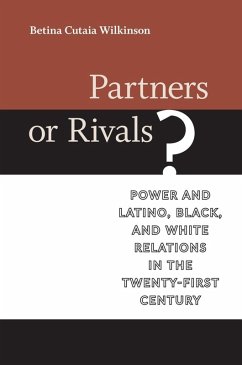The emerging demographic and political presence of Latinos in the United States has moved the discussion of race relations beyond the terms of black and white. Using a variety of theoretical approaches, Betina Cutaia Wilkinson assesses Latinos', blacks', and whites' perceptions of commonality and opposition in order to reach a more nuanced understanding of the factors affecting political competition versus cooperation among these groups. In the most comprehensive analysis of Latino, black, and white relations to date, Wilkinson explores the extent to which these groups regard each other as partners or rivals and uncovers the motivations that contribute to those views.
Relying on national survey and focus group data, the author examines how social interaction; feelings of identification with members of their own group and others; and individuals' sense of power as established by their racial, economic, and political surroundings impact interracial attitudes. Her findings, like the complex racial dynamics she studies, are not easily reducible to simple formulae, yet they have strong implications for the formation of interracial coalitions. For example, even if social contact generally decreases racial and ethnic hostility, the disadvantaged status of Latinos and blacks tends to impede cooperation and ramp up rivalry, leaving members of both groups more inclined to form coalitions with whites than with each other. Yet contextual factors in particular jurisdictions, such as the availability of quality education and higher wages overall, can mitigate antagonism and increase the likelihood of cooperation.
Ultimately, Partners or Rivals? provides a timely account of contemporary race relations and the prospects for interracial and interethnic cooperation, pinpointing the sometimes surprising factors that have a realistic chance of improving those prospects.
Dieser Download kann aus rechtlichen Gründen nur mit Rechnungsadresse in A, D ausgeliefert werden.









